HEAVEN and HELL?
Welcome to your Wednesday!
I had a lovely, busy day of coaching, and meetings yesterday. We had a lovely staff meeting yesterday and we all worked on the practice of our company values together. It was a lot of fun.
I’ve been so busy on the road for so many years, I haven’t been able to be too involved in the business side of things. As the business has grown, it has required more attention from Penny, myself, and Vidya to help each other manage it.
Whenever you have a team of people, there is a progressive need for leadership as the team grows. Now that I’m not traveling so much, I can apply myself to helping with the business end instead of spending most of my time as the key marketing agent, lecturing constantly all over the world.
I’m enjoying this new phase of my own development. It’s never boring, I assure you!
Though it was a very busy day yesterday, I did find time to get a good 20 minutes of stretching in the sunshine in. That always feels good!
It amazes me how as the muscles tighten, the mind and emotions reflect the tension of the body. After I stretch and mobilize my body to balance it, I immediately feel the relief in my emotional and mental bodies. The body can trap, or free the mind very easily.
Quite simply, this is because as long as you wear a body, it is inextricably linked with and associated with the mind; the emotions mediate the relationship between the two poles.
Today, I thought I’d share some thoughts on the issue of heaven and hell!
HEAVEN and HELL?
The concept of heaven and hell are expressed in pretty much every religion, thought the words used may change slightly from culture to culture; see A Sufi Message of Spiritual Liberty – The Sufi Message Vol. 5 (p. 53-59) by Hazrat Inayat Khan for a beautiful explanation of the issues of heaven and hell.
Hell, quite simply, is a word that expresses what people don’t want in every culture. Heaven is a word that exemplifies what people “think” they want in every culture.
The use of such terms (and their often wild and vivid descriptions) are, and have always been a means of controlling people.
My researches into brain washing led me to scholarly documents demonstrating that by the criteria of brain washing and an evaluation of the use of brain washing techniques, the Catholic Church had it mastered by the 8th century!
The Catholic Church (Christianity at large), Judaism, Islam, and most other religions and organizations (such as governments) have been refining and mastering it ever since.
Taoism, Buddhism, zen-Buddhism and Sufism (the mystical branch of Islam), which OSHO calls, religions for adults teach that such ideas only represent polarities of mind. Where the Abrahamic religions (Christianity, Islam and Judaism) essentially teach that you can’t access God directly, and that we are all essentially born sinners who must be redeemed through the medium of a savior (a father figure), the adult religions teach that such redemption is but mastery of your own mind.
Therefore, the reason that OSHO calls Abrahamic religions the religions for children and those that teach you how to master yourself as your own master religion for adults is that the adult religions teach independence.
The children’s religions treat people like children and create all sorts of commandments, rules and regulations that are overseen by a wrathful, potentially very angry and destructive (Father) God in the sky.
After many years of careful observation of my clients and patients, I’ve seen very clearly that those that have incomplete or ineffective parenting are very attracted to the perceived stability of the Abrahamic religions. They often come from chaotic family upbringings where parents were:
1. Unstable in their own mental-emotional self-expression.
2. Sacrificing the essential time and energy needed to love their children effectively to chase after the dream of being a king or queen; often they justify their shadow-actions by saying they are “doing it for their children!”
3. Broken in their own relationship. When parents split up in a child’s developmental years, there is typically an imbalance between the female quality of feeling and expressing emotion and the male quality of logic and justice. The child raised primarily by the mother becomes overly emotional and irrational. The child raised by only the father tends to become emotionally disconnected, overly rational and logic-based, and tends to impose rule by justice. The result, naturally, is a child that becomes an adult that expresses and exemplifies the parental imbalance. Their view of the world reflects their programming.
Those attracted to adult religions typically have the following in common:
1. They became “aware” that their parental programming wasn’t bringing them lasting joy or peace in their life and relationships. Therefore, they began taking notice of who around them was “balanced”. Inevitably, they find their mentors are associated with adult religious philosophies and wisely, begin to emulate such mentors (balanced parental figures).
2. They find books or media that exposes them to what’s missing in their life. Again, much of the medicine they seek at the depths of their psyche turns out to be expressing adult religious philosophy.
3. Through a process of logical deduction (which naturally emerges as the mind grows and develops), they find that the tenets of Abrahamic religions simply don’t add up. For example, they realize, soon enough, that the Abrahamic religions are based largely on promises of redemption in the afterlife. Since the afterlife is a mystery to most all, an “x” factor, they come to the realization that working yourself to death under piles of rules and regulations for a carrot in the sky isn’t such a wise idea. They realize that if they can create inner-peace here, on earth, now, that they don’t need to die to see if God tells lies! Very wise indeed!
Heaven and Hell in a Nutshell
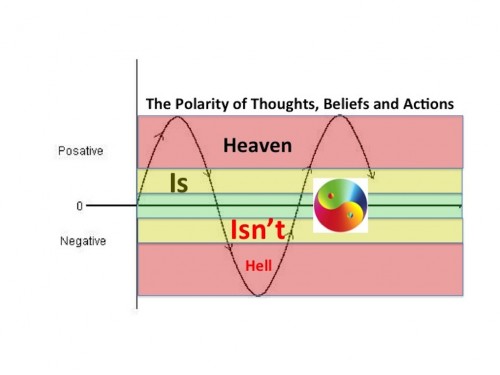
As my diagram above depicts, all labels such as “heaven” or “hell” express both duality, and codependence. One can’t possibly know what “hell” is without a relative opposite as a reference point. Can one possibly know what “good” is without some reference to what it perceptually “isn’t”? NO.
With very rare exceptions, people’s motives for behaving a specific way are attempts to get to and/or experience what they perceive they don’t want. This is essentially the very basis for rationalizing war: if we don’t kill them, we may have to live like them. This kind of motive is well established in both religion and religiously motivated warfare.
The Christian 10 commandments represent a set of rules and regulations proposed to be guidelines for getting to heaven. I’ve analyzed this approach extensively in my series comparing the Atheist, Native American and Christian 10 commandments at www.youtube.com/paulcheklive and share my views of each approach relative to the love model I live and teach.
In my lifetime, I’ve seen over and over again, that people are willing to create hell in their own lives and the lives of others as a means of getting to heaven. Is it working?
A very elementary understanding of physics and/or philosophy of mind teaches us that relative opposites can only be conceived relative to each other.
By definition, when we act in any way based on a motive to get to heaven, we at once create and substantiate the idea of hell equally; to the degree we invest in a heaven, we maintain and enliven the idea of hell and vice versa.
Anti-war rallies often become violent and only bring more energy to the ideas and acts of war. Those that oppose abortion because it takes life frequently harm and even kill physicians performing abortions and use acts of war to destroy their clinics. People that think they are doing good are very likely to condemn any opposing idea or action as bad.
Such entanglements can easily be exemplified with water:
If you are thirsty and/or dehydrated, drinking water is good. If you are already hydrated, drinking water just become someone tells you to, or tells you that doing so will get you to heaven faster, only disables your physiology and disables you.
The issues of heaven and hell are no different. When we create angels, we also at once affirm the idea of devils. After all, what in the world would angels do without any devils?
Who would devils be tempting without the influence of the so-called angels?
What would cops do without robbers and crooks?
Can you see the entangled nature of the co-dependence of polarized ideas here?
All virtues are double-edged swords:
Too much good hurts; working yourself into a state of illness in a university program so your parents or your ego can deify you as “good” only produces illness and disease, which may be seen as “bad” relative to balanced well-being.
Too much truth can wound people who can’t keep it in context.
For example, if you have children and on a Sunday morning you and your spouse decide to stay in bed and make love while your kids watch TV, when you come out of your room, you are likely to get questioned:
“Daddy, what were you and Mommy doing in your bedroom so long this morning, we wanted to play with you?”
“Well sweetheart, I was about to get up to come play with you when your mother decided to give me a blowjob.”!
Now, one may be so in love with the idea of being “truthful” that they don’t realize that any virtue can become a vice.
I purposefully created a heavily polarized example to make my point, yet, any variation on the them exemplifies the double-edged sword of virtue.
This is exactly why Lau Tzu warns against being “virtuous” – it quickly becomes justification for self-motived, contrivances. Such virtuous projections are often backed with the idea or statement that “that’s what God wants!”!
When we become honest with ourselves and seek to create harmony within that isn’t dependent upon what someone else says or does, we are ultimately freeing ourselves from the games of shadow-projection.
Heaven and hell just become tides in the ocean of life. When things are challenging, we don’t view that as hell. We simply understand that that is the nature of the moment. Just as all lows are eventually followed by a rising tide, all hellish experiences are gifts of “awareness”.
Through our awareness, we can become wise enough to recognize which of our thoughts and actions are influencing the tides.
When, with practice, we find the middle, we come to realize that such concepts are only valuable to the degree that they cultivate awareness that leads to improved self-responsibility. Improved self-management.
Those that are “wise” have all stated time and time again that heaven and hell are states of mind. There is no actual address for heaven or hell. They are not places. They are names for the kind of energy we are creating or contributing to.
If one reaches the highest heights of heaven, paradoxically, the only way they can possibly grow is to enter into hell and see if they can keep the heaven within them. When one hits “bottom” (hell), they soon realize that they must choose to create more heaven within.
When one finds Tao – the middle way, they realize what goes up must come down and what goes down can only come up. This awareness allows each of us to recognize when our “acts of good” are “highlighting evil” and making it more real.
As we mature spiritually, we explore our own mind and find that most of what we thought was heaven was a temporary state facilitated by money, drugs, sex or some external input that comes largely via co-dependency.
With that awareness, we become less and less motivated to “do good” or “avoid evil”. We no longer need to ride grade 5 rapids to “feel alive”. We no longer forgo our authentic needs to “please God or our parents, bosses, or authority figures.”
We come to see and experience that to the degree that we are authentically creating harmony within; we are at once creating and sharing that harmony with the planet and all living beings.
We eat until we aren’t hungry. We don’t rape the planet and stockpile mountains of corn. We seek efficient, safe fuel sources. We don’t trash the planet and start wars over oil, a very outdated but highly profitable fuel source that has almost destroyed the planet.
In the end, you will know your philosophy is healthy by HONESTLY asking yourself just two questions:
1. Would the world be a better, safer place for children and the rest of us if everyone in the world emulated my belief system and my actions?
2. What would Love do now?
To the degree that you hare healthy, sane and honest, the answer is most always obvious. To the degree that one is suffering from viruses of the mind, no such question can be seen in the light of truth because the shadow envelops reality, creating blindness and a never-ending search for (temporary) heaven!.
Practical Exercise
If you are brave enough to be honest at this time in your life, simply write down why it is that you do the things you do every day and then ask yourself, who am I trying to please and what do I expect in return.
Then, ask the two questions relative to your actions and meditate on weather you are contributing the world illness or world health.
For example: “I’m attending university to get my PhD in psychology so I can make a good living.”
Who am I doing this for? Me? My parents? Someone else?
Am I loving and caring for myself in the process, or am I becoming tired, pretentious, and climbing an imaginary ladder that allows me to feel better or more worthy of “good” (things) than others?
With just a little meditation on such issues, you are likely to find the viruses and then, with your new found awareness, you can choose to change your behavior such that if emulated by everyone, the world would be full of healthy, well-balanced psychologists.
Would heaven or hell be necessary after a couple generations of children born to healthy, well-balanced psychologists?
Love and chi,
Paul Chek

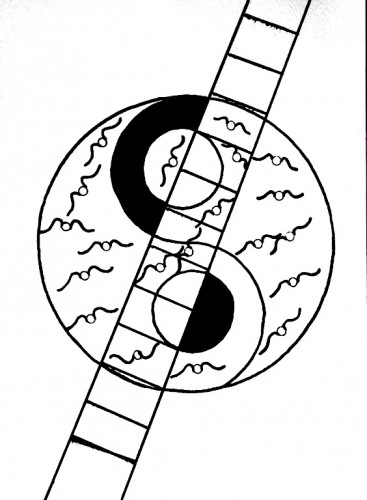

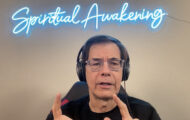
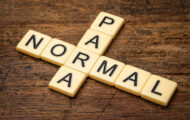


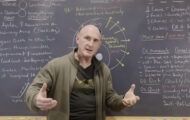







Find me on the web